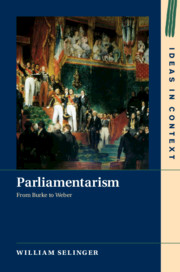Book contents
- Parliamentarism
- Ideas in Context
- Parliamentarism
- Copyright page
- Contents
- Acknowledgments
- Introduction
- Chapter 1 The Eighteenth-Century House of Commons
- Chapter 2 Edmund Burke’s Theory of Parliamentary Politics
- Chapter 3 The French Revolution and the Liberal Parliamentary Turn
- Chapter 4 Reinventing Parliamentarism: The Significance of Benjamin Constant
- Chapter 5 Democracy in America, Parliamentarism in France: Tocqueville’s Unconventional Parliamentary Liberalism
- Chapter 6 John Stuart Mill and the Victorian Theory of Parliament
- Conclusion
- Bibliography
- Index
- Ideas in Context
Chapter 3 - The French Revolution and the Liberal Parliamentary Turn
Published online by Cambridge University Press: 05 July 2019
- Parliamentarism
- Ideas in Context
- Parliamentarism
- Copyright page
- Contents
- Acknowledgments
- Introduction
- Chapter 1 The Eighteenth-Century House of Commons
- Chapter 2 Edmund Burke’s Theory of Parliamentary Politics
- Chapter 3 The French Revolution and the Liberal Parliamentary Turn
- Chapter 4 Reinventing Parliamentarism: The Significance of Benjamin Constant
- Chapter 5 Democracy in America, Parliamentarism in France: Tocqueville’s Unconventional Parliamentary Liberalism
- Chapter 6 John Stuart Mill and the Victorian Theory of Parliament
- Conclusion
- Bibliography
- Index
- Ideas in Context
Summary
One of the great legacies of the French Revolution was that it made parliamentarism the preeminent constitutional ideal of European liberalism. This chapter begins by examining the early constitutional debates of the Revolution when the English practices examined in previous chapter were rejected across the French political spectrum. I then examine Germaine de Staël and Jacques Necker, two of the most influential champions of these practices in 1790s France. Finally, I return to Britain, consider key advocates of parliamentarism there who were writing during this period and highlight the parallels between their arguments and those of de Staël and Necker. In both France and Britain, advocates of parliamentarism claimed that it was the only political framework that could enable a nation to be safely and durably governed by a representative assembly. But in both contexts, authors continued to grapple with the dilemmas of parliamentarism–above all, the dilemma of corruption.
Keywords
- Type
- Chapter
- Information
- ParliamentarismFrom Burke to Weber, pp. 83 - 114Publisher: Cambridge University PressPrint publication year: 2019

